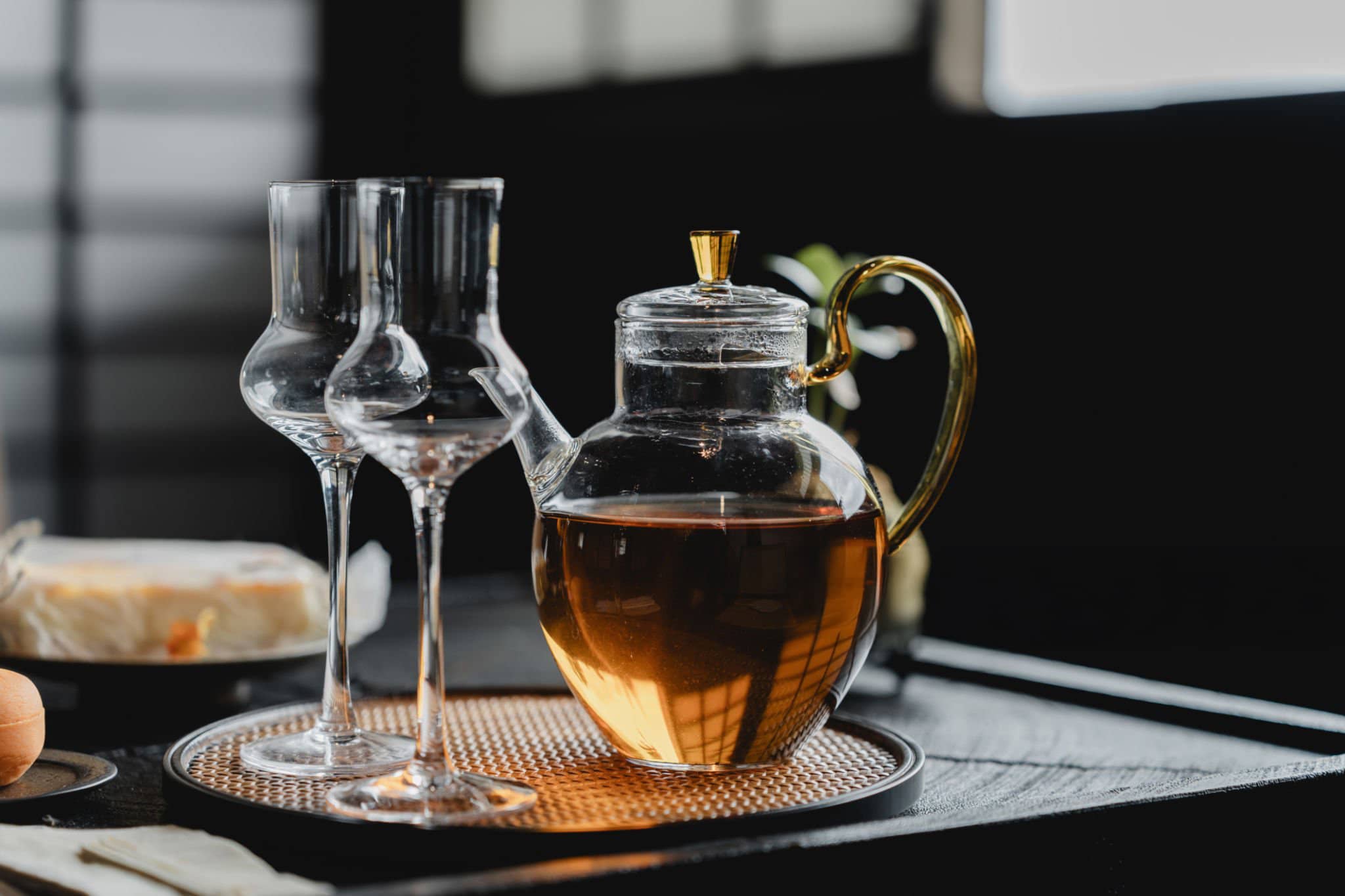Introduction
Black tea, with its rich color, bold flavor, and moderate caffeine, is one of the most consumed teas worldwide. Originating in China and spreading across Asia, Africa, and beyond, black tea’s popularity is attributed to its variety, taste, and potential health benefits. Known for its complex flavors that range from floral and fruity to malty and smoky, black tea’s versatility has made it an essential part of tea culture around the globe. In this article, we will dive into the history of Chinese black tea, its prominent growing regions, types, caffeine content, and its health benefits.
The History of Chinese Black Tea

Chinese black tea has a long and fascinating history dating back to the Ming Dynasty (1368–1644). Black tea, known as “hong cha” in Chinese, is believed to have originated in the Wuyi Mountains of Fujian Province. It is said that Lapsang Souchong (Zheng Shan Xiao Zhong), one of the earliest types of black tea, was created accidentally when tea farmers, delayed by military activity, allowed tea leaves to oxidize fully. To expedite the drying process, they smoked the tea over pinewood fires, producing the characteristic smoky flavor that Lapsang Souchong is known for today.
The popularity of black tea grew rapidly, particularly in Europe. In the 17th century, Chinese black tea became highly sought after by European traders due to its bold flavor and longer shelf life. It was especially favored in England, where it became the foundation for what we now know as English tea culture. The tea trade between China and Europe, led by black tea exports, laid the groundwork for a global appreciation of tea and influenced tea-drinking customs worldwide.
Origins of Black Tea
Chinese Black Tea

China is widely regarded as the birthplace of black tea, with primary production regions including Fujian, Yunnan, and Anhui. Each region produces distinct types of black tea with unique flavor profiles. Fujian Province is renowned for Lapsang Souchong, a smoked black tea with a bold, pinewood aroma, and Jin Jun Mei, a non-smoked black tea known for its honey-like sweetness. In Yunnan, Dian Hong is celebrated for its malty flavor and golden tips, while Keemun from Anhui is famous for its delicate floral and wine-like notes.
Indian Black Tea

India is another major producer of black tea, particularly known for its Assam and Darjeeling varieties. Assam tea, grown in the northeastern state of Assam, is known for its bold, malty flavor, making it ideal for strong black tea blends. Darjeeling tea, often called the "champagne of teas," is lighter and more floral, with a muscatel flavor that is highly prized by tea connoisseurs.
Sri Lankan (Ceylon) Black Tea
Sri Lanka, formerly known as Ceylon, is famous for Ceylon tea, a bright and citrusy black tea grown in the high-altitude regions of the island. Ceylon tea is characterized by its brisk, refreshing taste, making it a popular choice for iced tea blends. It is available in different varieties, depending on the region and altitude where it’s grown.
Kenyan Black Tea
Kenya is a leading producer of black tea in Africa, known for its robust flavor and deep color. Kenyan black teas are often full-bodied and astringent, making them ideal for tea blends such as English breakfast tea. The intense flavor of Kenyan black tea holds up well to milk and sugar, making it popular in breakfast teas.
Types of Chinese Black Tea
Lapsang Souchong (Zheng Shan Xiao Zhong) – Smoked Black Tea

Lapsang Souchong, also known as Zheng Shan Xiao Zhong, is a famous smoked black tea from Fujian's Wuyi Mountains. The tea leaves are dried over pinewood fires, giving them a distinctive smoky flavor. Lapsang Souchong is bold and full-bodied, making it a unique choice for those who enjoy rich, intense flavors.
Jin Jun Mei – Non-Smoked Black Tea

Jin Jun Mei, another premium black tea from Fujian, is known for its honeyed sweetness and delicate floral aroma. Unlike Lapsang Souchong, Jin Jun Mei is a non-smoked black tea made from young buds, giving it a smooth, refined taste. This tea is perfect for those who appreciate a lighter, more elegant black tea.
Other Famous Chinese Black Teas – Dian Hong and Keemun


Dian Hong from Yunnan and Keemun from Anhui are also notable Chinese black teas. Dian Hong has a rich, malty flavor with golden tips, while Keemun is known for its wine-like aroma and floral notes. Both of these teas offer a taste of authentic Chinese black tea without the smoky profile of Lapsang Souchong.
Caffeine Content in Black Tea

Does Black Tea Contain Caffeine?
Yes, black tea does contain caffeine, typically ranging between 40-70 mg per 8-ounce cup. This caffeine content provides a moderate boost in energy, helping improve focus without the intense effects of coffee.
Factors Influencing Caffeine Levels in Black Tea
The caffeine content in black tea can vary based on factors like leaf size, oxidation level, and brewing method. Whole leaves release caffeine more slowly, while tea bags or crushed leaves tend to release it faster. Longer steeping times and higher water temperatures can also increase caffeine extraction.
Black Tea vs. Other Teas and Coffee
Compared to other teas and coffee, black tea has a moderate caffeine level. While green tea has around 20-30 mg of caffeine per cup, coffee contains roughly 95 mg. Black tea’s caffeine content provides a balanced boost that is less intense than coffee, ideal for sustained energy throughout the day.
Black Tea Benefits

High in Antioxidants
Black tea contains antioxidants, particularly polyphenols, that help neutralize free radicals in the body, supporting cellular health and reducing oxidative stress. Regular consumption of black tea can contribute to overall wellness by boosting the body’s natural defense mechanisms.
Enhances Mental Alertness
The combination of caffeine and theanine in black tea promotes mental clarity and focus without causing the jitteriness often associated with coffee. Black tea is a great choice for those looking to maintain steady energy levels and concentration.
Supports Digestive Health
The tannins in black tea can soothe the digestive tract, helping improve digestion and relieve mild digestive discomfort. Drinking black tea after meals can aid digestion and promote a sense of well-being.
Selecting and Brewing Black Tea

Choosing Quality Black Tea
When selecting high-quality black tea, look for whole leaves with a strong aroma and uniform color. Loose leaf tea is generally preferred over tea bags, as it contains whole or large tea leaves, offering a more refined flavor.
Ideal Brewing Techniques for Black Tea
Black tea is best brewed at a water temperature of 194-212°F (90-100°C) with a steeping time of 15-30 seconds. Adjust the steeping time to achieve a lighter or stronger flavor according to personal preference.
Conclusion
Black tea, with its diverse flavors and global heritage, offers a unique experience that appeals to both new and seasoned tea drinkers. From the smoky depth of Lapsang Souchong to the sweet, floral notes of Jin Jun Mei, there is a black tea for every preference. With its moderate caffeine, high antioxidant levels, and potential health benefits, black tea remains a versatile, enjoyable beverage worldwide. Exploring the types and origins of black tea allows tea enthusiasts to savor its history and flavor in every cup.



